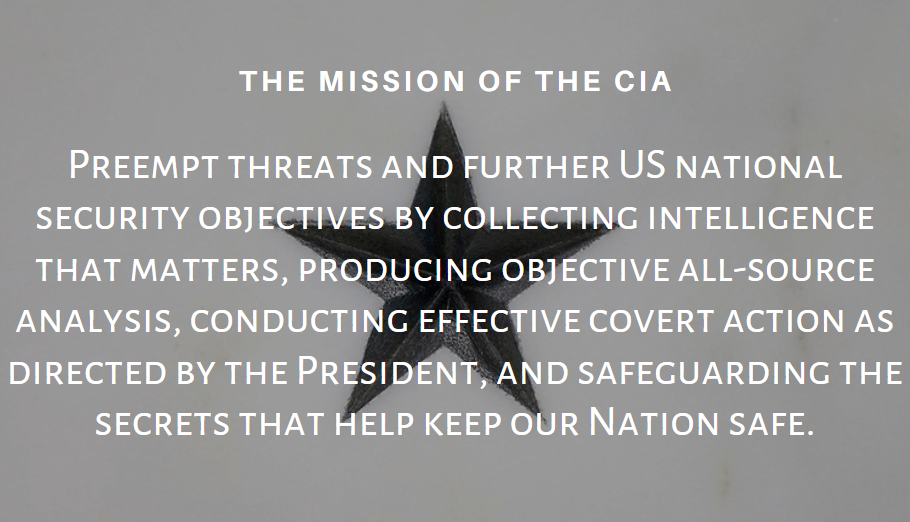So you want to be a spy? Advice from a former CIA officer
Practical advice for applicants from a former CIA officer
This article was inspired by a recent podcast episode I recorded with Covert Contact, a Blogs of War national security podcast: ‘Preparing for A Career in Intelligence: Thoughts on Personal Security and Behavior’

Has Jack Ryan got you daydreaming of being whisked away by helicopter from a garden party to tackle a pressing national security crisis? Ah, spy lore! Fabled escapades aside, it’s true that being a spy can be a rewarding career.
If you’re considering a position with the Central Intelligence Agency (CIA), the prospect of applying might feel a tad daunting. The CIA, considered the premier intelligence agency, is highly selective and because of the classified nature of its work, the agency’s screening process can be long and arduous.
What can you do to best position and protect yourself as an applicant?
- Do NOT post online about your interest in CIA
Warning. Be discreet about your interest. Not everyone has good intentions. Avoid sharing your interest broadly and protect your own career opportunities and your own security from unthinking loudmouthed friends and relatives, or worse: becoming a target of nefarious actors.

Go to the source. Need more info about the Agency? Go to CIA.gov to read up on career opportunities (check out the CMO role; it’s the best, though I’m biased). Take the time to learn about CIA’s organizational structure and the values that guide CIA officers. You can even virtually tour the CIA museum and its cool historic artifacts.
Get to know CIA officers. Curious about life as a CIA officer? There are many memoirs by former officers to choose from but for contemporary insights, I recommend the following by former female officers whose memoirs demonstrate the drive, sacrifices, and (typically unknown) heroics of everyday CIA officers: The Targeter by Nada Bakos; The Unexpected Spy by Tracy Walder; and In the Dark of War by Sarah Carlson.
2. Be smart on social media
Warning. The online space is an extension of your reputation. Be intentional about what you post, content you allow yourself to be tagged in, and which posts you like or share. Ask yourself: what does my online persona say about me?

Know what’s out there. It’s important to know what is easily discoverable about you. Do a scrub of your own online footprint. Google yourself. Delete what you don’t want out there (keeping in mind the adage: once online, always online) and reach out to friends or family to remove any undesirable photos or content they’ve shared that includes you.
Think before you post. Far easier than cleaning up your digital footprint is being intentional about what you share in the first place. Think before posting.
3. Know your networks
Warning. To the extent possible, be aware of who is in the groups you interact with, whether online or in-person. If you are sharing struggles and setbacks with strangers, those same intimacies could be seen as vulnerabilities and used against you.

Trust is earned. Practice discretion when engaging with people in your networks, whether they are online (e.g. Facebook groups, Instagram, Twitter, direct messages) or in-person. Especially online, not everyone is who they claim to be. Hold back on sharing sensitive personal information until you know the person or people well.
4. Know yourself
Warning. The CIA is a demanding organization with a demanding mission. It requires discretion, discipline, curiosity, integrity, commitment, and sacrifice. You have to be flexible and adaptable, comfortable with ambiguity, willing to take risks, and travel anywhere in the world based on mission need. The work is classified so work stays at work. It’s a job that requires a low profile and is not done for outside recognition.

Know what motivates you. Why do you want to work for the CIA? Think about why an intelligence career appeals to you, whether the mission resonates, and what contributions you hope to make. For me, CIA’s mission aligned with my passion for international relations, my deep respect for public service, and desire to help protect the nation after 9/11. What’s important to you and what motivates you matter in determining if the CIA is a good fit.
Your moral compass matters. Intelligence work comprises a world of gray and rarely is anything black and white. One of the first things Agency officers learn is the importance of speaking truth to power. You should have a strong sense of right and wrong, and the confidence to speak up when necessary, including to those in leadership. An internal compass and inner strength will serve you well in your future intelligence career.
The above was adapted from a recorded podcast with Covert Contact. To listen to the full podcast episode on ‘Preparing for a Career in Intelligence,’ visit: https://covertcontact.com/2020/08/16/preparing-for-a-career-in-intelligence-thoughts-on-personal-security-and-behavior-episode-108/
All statements of fact, opinion, or analysis expressed are those of the author and do not reflect the official position or views of the CIA or any other U.S. Government agency. Nothing in the contents should be construed as asserting or implying U.S. Government authentication of information or Agency endorsement of the author’s views.
